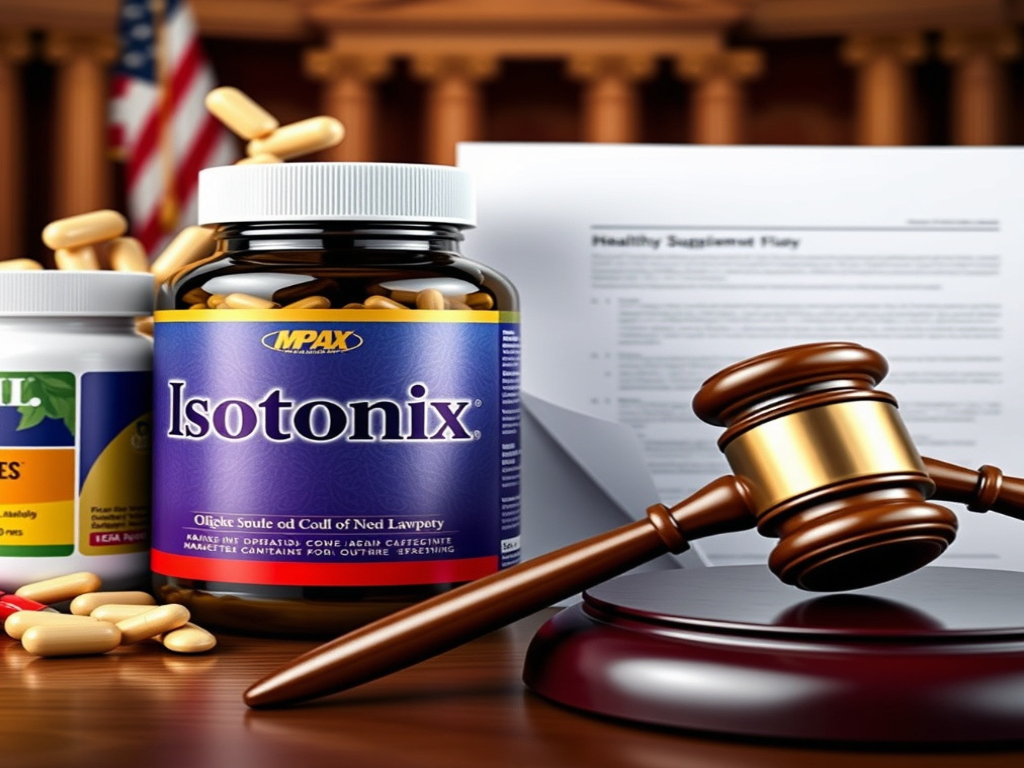Overview of the Isotonix Lawsuit
The Isotonix lawsuit represents a significant legal case that has garnered attention in the health and wellness industry. It arose from consumer allegations regarding the safety and efficacy of Isotonix products, which are marketed primarily for their nutritional and dietary benefits. The origins of the lawsuit can be traced back to concerns expressed by consumers who claimed that these products did not deliver the asserted health benefits nor adhered to the safety standards expected in the marketplace.
At the heart of the lawsuit are several key players, including the plaintiffs, who are often individual consumers or groups that have purchased Isotonix products. In response to the claims made against them, the manufacturers and distributors of Isotonix, often represented by larger parent companies, have taken a stand to defend their products, asserting that they comply with all regulatory guidelines and that their marketing claims are substantiated by scientific research.
The specific claims against Isotonix are varied but primarily focus on allegations of false advertising, misleading health claims, and potential health risks associated with the consumption of their products. The legal action has opened up discussions regarding the broader implications for product safety and efficacy within the health and wellness sector. The lawsuit serves as a critical point of reflection for consumers, manufacturers, and regulatory bodies alike, emphasizing the need for transparency and accountability in the marketing of health-related products.
Overall, the Isotonix lawsuit highlights significant issues related to consumer trust and the integrity of health and wellness claims. As the case progresses, it is likely to set precedents for similar cases in the future, impacting how dietary supplements are marketed and regulated.
Key Allegations and Legal Implications
The Isotonix lawsuit brings to light several crucial allegations that could significantly impact the company’s operations and reputation. Central to the legal actions are claims related to false advertising, which assert that Isotonix misrepresented the health benefits and efficacy of its products. Consumers argue that the company’s promotional materials led them to believe that these supplements could provide extraordinary health benefits, which they did not experience. Such allegations raise serious questions about the validity of the claims made in product marketing and the potential for misleading consumers.
Additionally, the lawsuit points to potential violations of consumer protection laws. If it is determined that Isotonix intentionally deceived customers about its products, it may face substantial legal repercussions. Consumer protection laws are designed to shield buyers from unfair practices, and if found culpable, the company could be subject to fines and mandated changes in their marketing strategies and product formulations.
At the heart of these allegations is also a concern regarding product safety. There are claims that certain ingredients used in Isotonix products were not adequately tested for safety prior to their market release. This is particularly relevant in the context of dietary supplements, where regulatory oversight is often less stringent compared to pharmaceuticals. The implications of these allegations extend beyond legal ramifications; they could potentially erode consumer trust and negatively affect sales. Stakeholders, including investors and retailers, may also reconsider their relationships with Isotonix, fearing reputational harm and possibly a decrease in market share.
In conclusion, the allegations within the Isotonix lawsuit not only suggest possible legal violations but also pose broader implications for the company’s future dealings in the marketplace. The outcome of this lawsuit holds significant importance for consumers, stakeholders, and the broader consumer products industry.

Reactions from Stakeholders
The Isotonix lawsuit has generated a significant reaction from various stakeholders, showcasing a range of perspectives that highlights the complexity of the situation. The company, known for its nutritional supplements and other wellness products, has issued public statements in response to the allegations. In these communications, Isotonix has asserted its commitment to quality and consumer safety, emphasizing that it intends to vigorously defend its practices. The company maintains that the lawsuit is unfounded and attributes the claims to a misunderstanding of its product formulations and marketing strategies.
Consumer response has been mixed, with some existing customers expressing concern about the potential ramifications of the lawsuit. Many loyal users of Isotonix products have taken to social media and online forums to voice their support for the brand, citing their positive experiences with the products. Conversely, there are potential customers who have grown hesitant due to the legal proceedings. Consumer trust is a pivotal factor in the health and wellness industry, and uncertainty surrounding the Isotonix lawsuit may influence purchasing decisions as prospects seek clarity before investing in the brand’s offerings.
Industry experts and legal analysts have weighed in on the matter, providing insight into the implications of the lawsuit for Isotonix. Some experts suggest that the legal challenges could lead to increased scrutiny of the company’s products and claims, potentially prompting regulatory reviews or changes in marketing practices. Others comment on the broader implications for the supplement industry as a whole, noting that such lawsuits can instigate heightened awareness of consumer rights and product integrity. The reactions from stakeholders not only reflect individual opinions but also underscore the potential impact of the Isotonix lawsuit on market dynamics and consumer confidence across the sector.
Future Outlook and Consumer Considerations
The Isotonix lawsuit has raised significant concerns among consumers, prompting a need for vigilance as the legal proceedings unfold. With ongoing investigations and discussions regarding the safety and efficacy of Isotonix products, consumers should remain informed about recent developments. It’s crucial for individuals to monitor updates through reliable news sources and legal blogs that specialize in health and wellness products, as they can provide insights into potential changes or resolutions in the case.
In light of the lawsuit, reassessing personal usage of Isotonix supplements may be prudent. Consumers should consider evaluating their health needs and determining whether Isotonix products continue to meet those criteria effectively. Consulting with healthcare professionals can also provide guidance, especially for individuals who may experience adverse effects or have concerns about product safety. Being proactive in understanding one’s health and supplement intake is essential as ongoing litigation can introduce uncertainty regarding product reliability.
Furthermore, understanding consumer rights is fundamental during this legal dispute. If affected by the Isotonix lawsuit, individuals may have options to seek redress for any grievances. Familiarity with consumer protection laws can empower individuals to address any issues they may encounter while using Isotonix products. Filing complaints with relevant regulatory authorities can also be a pathway to ensuring accountability from the manufacturer.
As the situation progresses, remaining informed and adaptive is key for consumers navigating the implications of the Isotonix lawsuit. By staying updated and proactive, individuals can make well-informed decisions about their health and the products they choose, balancing the benefits and potential risks associated with Isotonix offerings.
May Be You Also Read





